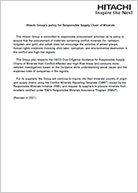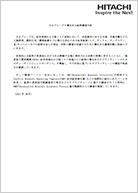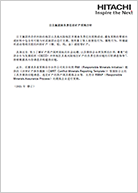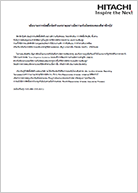In order to grow sustainably and improve social value, Hitachi must meet a range of social expectations. As well as creating the innovation sought by society, we need to establish a working environment where diverse talents can shine, and also implement fair business practices rigorously and respect for human rights throughout the value chain.
SAQ completed
by procurement partners
4,029
companies
Sustainability audits
153
companies
Sustainable procurement
seminars
156
companies
(FY 2024)
Hitachi understands that business activities respecting human rights are essential for the development and survival of companies, and that all companies have responsibilities to fulfill.
Under the Hitachi Group Human Rights Policy formulated in FY2013, we promote human rights due diligence (HRDD) and other initiatives to respect human rights and reduce risks in the Hitachi value chain.
To implement respect for human rights throughout the entire value chain, Hitachi has included the Hitachi Group Human Rights Policy in the Hitachi Group Sustainable Procurement Guidelines. Hitachi is working to promote understanding of our approach of respect for human rights among our procurement partners, and is advancing to put our policies into practice.
Hitachi establishes and operates an effective and highly accountable due diligence process in order to minimize labor and human rights risks at procurement partners.
Since FY2022, we utilized EcoVadis*, a third-party evaluation platform, to assess and monitor our sustainability performance relating to human rights, including forced labor and child labor. We conducted initial risk screening and document-based survey by EcoVadis. We also performed sustainability audits, including labor and human rights. We explained to the procurement partners the issues identified during the audits and requested them that they would make improvements.
In addition, as a place for information sharing and deliberation across the Group, the HRDD Executive Managers Meeting is held 1-2 times a year.
With the purpose of risk management and engagement with procurement partners, Hitachi evaluates and analyzes the state of sustainability initiatives at procurement partners.
Starting in FY2022, we adopted the EcoVadis third-party evaluation platform for monitoring and evaluating the sustainability performance of our procurement partners. We perform assessments regarding procurement partners who represent a large portion of our procurement and who are important to our business strategy. We confirm sustainability efforts based on a checklist covering four areas: environment, labor and human rights, ethics, and sustainable procurement. In FY2024, we conducted sustainability assessments of 4,029 procurement partners (in 62 countries) across the Hitachi Group.
We use the information obtained from these evaluations to identify companies requiring corrective action, to discuss
and monitor improvement methods, and to select and conduct sustainability audits. We will continue to work with more procurement partners and expand the number of our partners evaluated by EcoVadis assessment.
To promote and ensure sustainable procurement, Hitachi conducts annual sustainability audits by visiting the manufacturing sites of procurement partners.
These audits check the sustainability initiatives of our procurement partners from the perspectives of “labor and human rights”, “health and safety”, “environment” and “ethics”.
From FY2022, we utilize EcoVadis to visualize sustainability risks in our value chain.
By understanding the sustainability risks of each procurement partner through the use of EcoVadis, we build a more transparent process of sustainability audits and corrective actions at procurement partners.
Partners that are audited are chosen based on the results of document surveys and the scale and importance of procurement dealings withHitachi. In FY2024, sustainability audits were conducted on 153 procurement partners. For any matters identified during the audit, we explain the details to our procurement partners. In particular, when high-risk matters are identified, we ask our procurement partners to take corrective action, including identifying the cause of the occurrence and formulating an improvement plan. After which, we continue to provide guidance and monitor improvements.
Going forward, Hitachi will continue to expand its sustainability initiatives and reduce sustainability risks in the value chain by giving training tosupport improvements and conducting follow-up audits in-person for procurement partners who are deemed to be at high risk as a result of these audits.
We held sustainable procurement seminars in an effort to deepen procurement partners' understanding on Hitachi policies and the importance of sustainability.
We invite our procurement partners in Southeast Asia, India, China, and Japan to the Regional Sustainability Procurement Seminar to address social issues proactively together with our procurement partners. 156 procurement partners participated in the FY2024 seminar. We strive to communicate the Hitachi Group Sustainable Procurement Policy to each region.
In addition to these seminars, since FY2022 we have held online sessions jointly with EcoVadis for procurement partners. In these seminars, we explained the importance of sustainability assessments and the benefits EcoVadis brings to our procurement partners. We continue to encourage our partners around the world to use EcoVadis.
The Hitachi Global Compliance Hotline is a 24/7, confidential and anonymous helpline and online reporting system. It is managed by an independent third party and is available to all Hitachi Group employees, contractors, business partners including procurement partners and other stakeholders. Anyone can seek guidance on ethics questions including human rights and harassment issues, and report any concerns or actual or suspected breach of the Hitachi Group Code of Ethics and Business Conduct or any other improper or illegal conduct.
To efficiently address and resolve contacts to the Hitachi Global Compliance Hotline, we assign inquiries to a resource who is a subject matter expert. When employees, contractors and business partners observe or suspect something that conflicts with the Hitachi Group Code of Ethics and Business Conduct, company policies or protocols or laws and regulations, Hitachi encourages you to speak up and report it.
Together, we must hold ourselves to the highest standards of business ethics and integrity, fulfilling our Mission and working to improve people's quality of life and our customers' social, environmental, and economic values to create a sustainable future.
In 2013, Hitachi formulated its Conflict Minerals Procurement Policy, declaring its stance regarding conflict minerals (tin, tantalum, tungsten, and gold) and cobalt. In 2016, a revision explicitly laid out the measures to be implemented to ensure responsible procurement.
However, a global trend has emerged in which company procurement responsibilities are not just limited to avoiding complicity in conflicts. Companies also need to address broader risks to human rights in any region. Aligning with this trend, in 2021 we revised the above policy to formulate the Hitachi Group's policy for Responsible Supply Chain of Minerals.
Hitachi is working to ensure responsible procurement in order to avoid supporting armed groups, human rights violations including child labor, corruption, and environmental destruction in conflict and high-risk areas.
This procurement policy is available in four languages (Japanese, English, Chinese and Thai).



